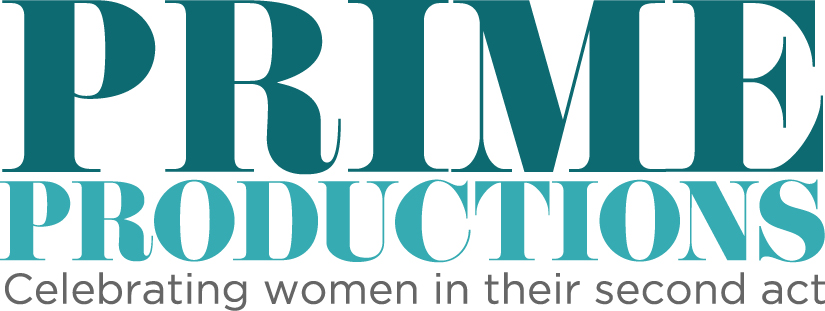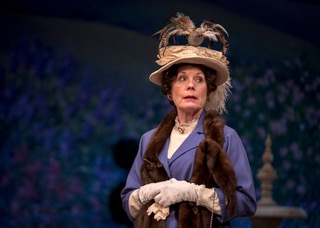When a Woman Gets That Coveted Role
BEFORE: Alison Edwards dressed for success.
Alison Edwards, one of three founders of Prime, has learned dozens of lessons over her decades in the theater, such as frustration is funnier than anger when your husband’s in love with a dog and if you’re the only one in your kindergarten class who can remember lines, the role of Mother Goose is all yours.
Now, a few years north of kindergarten, Edwards says it’s not quite as easy to memorize entire scripts. But the trade-off is that a woman of a certain age has more confidence, more experience and an innate quirkiness for the roles relegated to non-leading ladies.
Her last role was definitely quirky: “I come on stage with a bird on my head,” she says, referring to her character’s outrageous hat.
AFTER: Alison Edwards as Lady Bracknell in Rochester.
Finding meaty roles as a woman in her second act is a challenge. So when Edwards saw the role of Lady Bracknell in the Rochester production of The Importance of Being Ernest, Oscar Wilde’s parody of high society, advertised on Minnesota Playlist, she auditioned even though it was a long way from home. Lady Bracknell is a coveted role—although Edwards has always wanted to play the daughter, Gwendolyn. Actually, she confides, while she’s too old to play the daughter, she wasn’t entirely sure she was old enough to be her mother. Thus is the dilemma of women in theater. The play had nine performances in late June.
As a young girl growing up in an era where girls were raised to be good girls, Edwards has always gravitated toward the villains. Her parents were in community theater and she learned to entertain herself in dressing rooms and green rooms. Acting, she says, gives one a “magical sense of being someone you’re not…theoretically, someone more interesting. “I’d rather play Lady Macbeth than (Romeo’s) Juliet,” she points out.
Usually, auditions have an interesting dynamic. “The more I want the role, the more nervous I get,” she says. But because of the commute for rehearsals as well as performances, she was much more relaxed for this outing. And it worked in her favor.
“The director liked my take on the character,” she says, which was a little less strident, a little more accepting of the scheming Algernon.
Wilde’s iconic play has very specific language and odd phrasing. “You have to stay on script,” she says, which means no ad libbing if you forget a line.
Her routine is to arrive early, settle in, have a cup of tea or coffee and then start the process of transforming herself into the character. She does her own makeup because that’s when the character starts appearing in the mirror. “I like to have control,” she says. The wig is the final touch in the transformation. Her only superstition is to have the script at the theater—“even if I don’t look at it.”
Over the years, she’s played a variety of roles, including the wife in Sylvia ,a play about a husband who brings home a dog—played on stage by a human—he finds in the park. Her lines should have elicited laughs from the audience, but night after night, they weren’t laughing. The director kept saying it was OK, but Edwards wasn’t OK with OK. She finally asked her stage husband’s advice and he told her to act frustrated, not angry. She did, and the audience laughed.
An experience that was both a high and a disconnect was playing Judith Light’s understudy on a national tour. “Someone said it’s like going to a dance and not being able to dance,” she says. You’re always ready, but seldom called.
Conventional wisdom says that if you put something out to the universe, it comes back in spades. That may be what’s happening with Edwards and Prime, because right on the heels of Lady Bracknell, she was cast in Ripcord, a play about two women forced to share a room in a senior living facility who engage in a no-holds-bared competition to determine who goes and who gets the bed by the window. One of the women’s family owns a skydiving business, which contributes to the unlikely comedy. “There are parachutes on stage,” Edwards stresses. That play opens the end of September (2019) at the Sidekick Theater in Bloomington.
In addition, Prime is hosting a series of readings in the fall and producing their third play.
It would be nice to finally devote herself to theater full time, but there’s still work to be done on that front. And Edwards has to have her own parachute—a “survival job.


